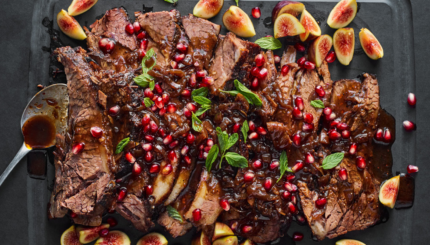The ringing of the phone in the middle of the night jarred us awake. The voice at the other end sounded gruff.
“I’m here with your packages. I’ll meet you in the back of the strip mall at the south end of town. And bring the money.”
I nudged my husband, who rolled out of bed, got dressed, grabbed his wallet, and staggered sleepily to our car. Ten minutes later, behind a large truck in a dark and otherwise empty parking lot, the exchange was made.
A drug deal? A transfer of counterfeit goods? Something worthy of a spy film?
No.
It was just another delivery of a kosher meat order to our small community in Southwest Virginia.
Non-perishable kosher foods are available everywhere in supermarkets. Not so for perishables like beef or chicken. For those who live in large metropolitan areas, getting kosher meat is no big deal. It’s there in the butcher shop. It’s in the freezer section of the grocery store. It’s at the deli. It’s available at a moment’s notice for that unexpected visit from Aunt Tillie and her too-hungry family or to satisfy that sudden yen for rib-eye steaks on the grill.
But imagine what it’s like for those of us who live in places such as Blacksburg, Virginia, a small college town many hours away from any source of kosher food. Trying to keep a kosher household is no small feat when you live so far from the usual channels of kosher commerce.
I was introduced to this challenge in my own Jewish household when we first moved to Blacksburg over thirty years ago. My husband and I had just taken faculty jobs at Virginia Tech. A kosher butcher in North Carolina had agreed to fill my order and ship it to us – frozen and on ice – by bus. What I didn’t realize was that though the butcher was only a four hour drive away, the order itself had to travel a much longer route, transferring from bus to bus, standing for hours at depots waiting for the right connection. And it was August. By the time the meat order arrived at the old bus station in town, the ice had melted, the cartons had disintegrated, and the meat had defrosted. Package after package slid miserably out of the cargo bay onto the hot sidewalk.
Thus it began. Over the years, nearly each meat delivery, no matter what butcher shop it came from, has had its share of drama. One order was dropped off in the wrong place. Another missed its connection and went straight on to Washington DC. Neither was seen again.
One kindly butcher in Atlanta, who had his own refrigerated delivery van, agreed to have his driver bring our order to us. But the driver had a number of stops along the way, and he didn’t make it to Blacksburg until 11 at night. Of course, he couldn’t be expected to start the seven-hour drive back right away. So, he spent the night with us. We never saw him again, either.
If an order is sent in a refrigerated truck by common carrier, you have to be available at a moment’s notice. The drivers are on a tight schedule and they cannot wait. Once I had to race from the eye doctor’s office, eyes fully dilated but not yet examined. I knew it would be weeks before I could get another appointment to see the doctor but, with the High Holidays approaching, the meat order was vastly more important.
Given the stress and the shipping costs, it becomes necessary to adopt additional strategies. Whenever I travel, I try to bring back a suitcase stuffed with kosher meat items. No need to check baggage tags. Mine is the only suitcase on the carousel that is sweating with water condensed onto its frozen contents. And out-of-town guests have been kind enough to bring kosher meat with them when they come to stay with us. My sister was particularly helpful until the time the unusual contents of her bag caused her to be singled out by airport security. She became an unwanted center of attention when the TSA agent called over to the supervisor and complained loudly, “You had me check out a pot roast!”
Technology is helping. There are now internet companies that make it possible to order kosher goods online, shipped in dry ice. This does restrict us in some ways since we are limited to the quantities that the companies offer instead of what we actually need. And there are still occasional glitches. But we’re keeping our fingers crossed that the internet option will continue to expand and help us preserve our traditions.
Oh yes. Friends have suggested that we abandon the struggle. Why bother with the uncertainty, the cost, or the aggravation? Forget kashruth, they say. But keeping kosher is too important to us to give up just because it’s “inconvenient.” It’s part of who we are.
So, if you want to celebrate Shabbat with us in small-town America, you’re most welcome… but please bring along the next round of kosher brisket, won’t you?



